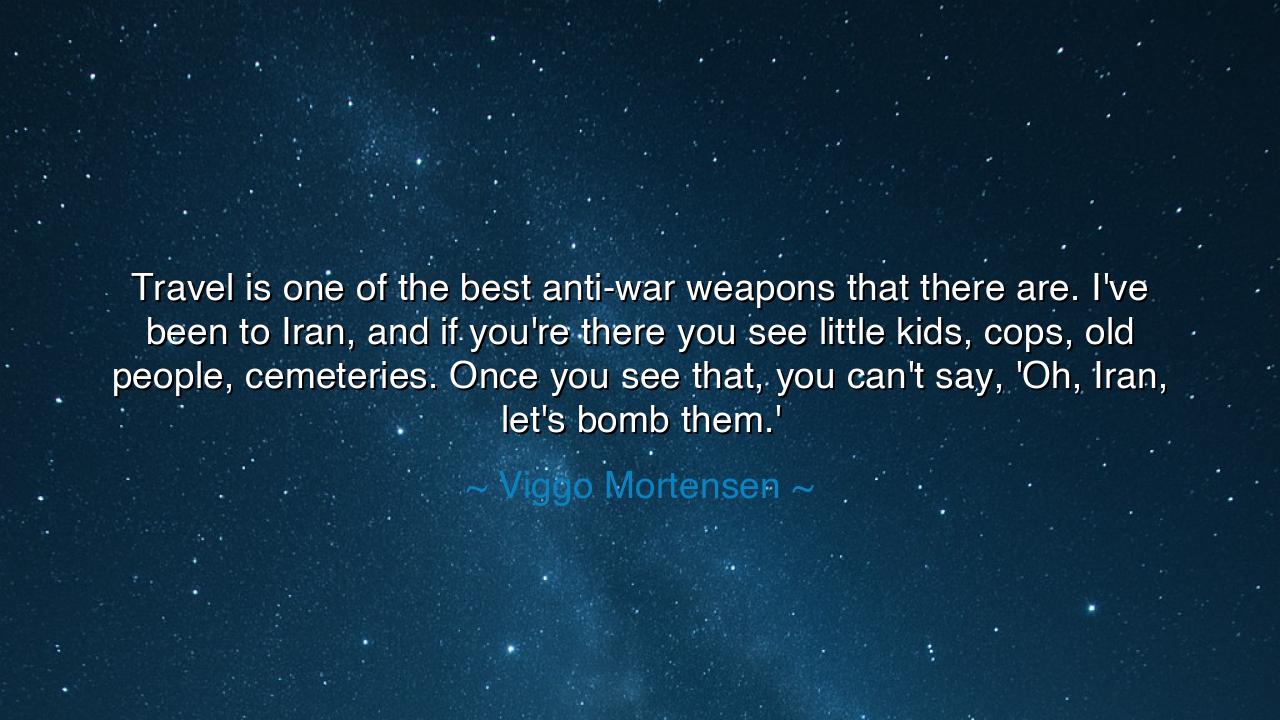
Travel is one of the best anti-war weapons that there are. I've
Travel is one of the best anti-war weapons that there are. I've been to Iran, and if you're there you see little kids, cops, old people, cemeteries. Once you see that, you can't say, 'Oh, Iran, let's bomb them.'






When Viggo Mortensen declared, “Travel is one of the best anti-war weapons that there are. I’ve been to Iran, and if you’re there you see little kids, cops, old people, cemeteries. Once you see that, you can’t say, ‘Oh, Iran, let’s bomb them,’” he gave voice to a truth that humankind often forgets: it is easier to destroy the faceless than the familiar. His words remind us that war feeds on distance and ignorance, while peace is nourished by familiarity and shared humanity. To walk the streets of another land, to look into the eyes of its people, is to recognize in them our own reflection—and once that recognition is born, hatred falters.
The meaning is profound. War often thrives on abstraction. Nations are painted as enemies, peoples are reduced to statistics, cultures are labeled as threats. In such simplification, cruelty becomes possible. But travel dissolves abstraction. To sit with families, to pass children in the marketplace, to notice the same rhythm of life—birth, work, play, grief, death—reminds us that beyond politics and power struggles, every nation is made of human beings. Mortensen’s words are a plea to remember this humanity. When you see cemeteries, when you realize their dead are mourned as your own are, you cannot so easily call for destruction.
History offers us powerful examples. During World War I, soldiers from opposing sides famously laid down their arms on Christmas Eve, stepping into No Man’s Land to exchange gifts, sing carols, and even play football. For a brief moment, they saw each other not as enemies, but as men—sons, fathers, brothers. That fragile peace collapsed under the machinery of war, but the story endures as proof of Mortensen’s insight: once we see the humanity of others, it becomes almost impossible to kill them. Travel, unlike propaganda, builds bridges rather than walls.
Mortensen speaks from his own origin of experience. As an actor, poet, and traveler, he has wandered far beyond his homeland, immersing himself in other cultures. His mention of Iran is not casual; it is a land often demonized in political rhetoric. Yet for him, it is not a caricature but a reality: a place with children playing, policemen walking their beats, elders watching from doorways, and loved ones resting in cemeteries. By witnessing the ordinary, he reveals the extraordinary truth: there are no nations of monsters, only nations of people.
The lesson for us is urgent. If we wish to resist the drums of war, we must step into the shoes of others. We must refuse to let entire peoples be reduced to enemies in our minds. By traveling, by learning, by engaging with those different from us, we inoculate ourselves against the poison of dehumanization. Peace does not grow from treaties alone—it grows from empathy, from the recognition that no mother anywhere desires her child’s grave to be dug.
In practical action, this means: if you can, travel—not as a conqueror, not as a tourist seeking only comfort, but as a humble guest. Seek the stories of those who are different from you. If travel is beyond your reach, then read, listen, and watch with an open heart the accounts of ordinary people in other lands. Build friendships across borders through conversation, art, and shared knowledge. Every time you refuse to see an “enemy” as faceless, you wield one of the greatest anti-war weapons we possess.
Thus Mortensen’s words ring out as both warning and hope: “Once you see that, you can’t say, ‘Oh, Iran, let’s bomb them.’” It is a call to awaken our dormant empathy, to confront the dangerous ease with which leaders wage wars upon strangers. Let us then embrace the weapon of travel, not to dominate, but to understand. For in every face we see abroad, we see a mirror of our own humanity—and in that recognition lies the power to disarm hatred, and to build a peace that no bomb could ever bring.






AAdministratorAdministrator
Welcome, honored guests. Please leave a comment, we will respond soon